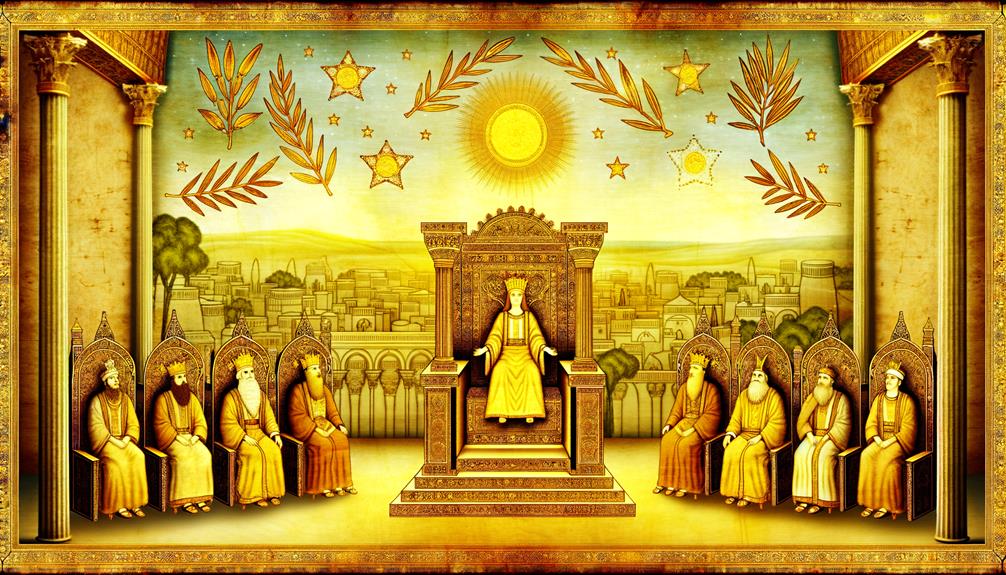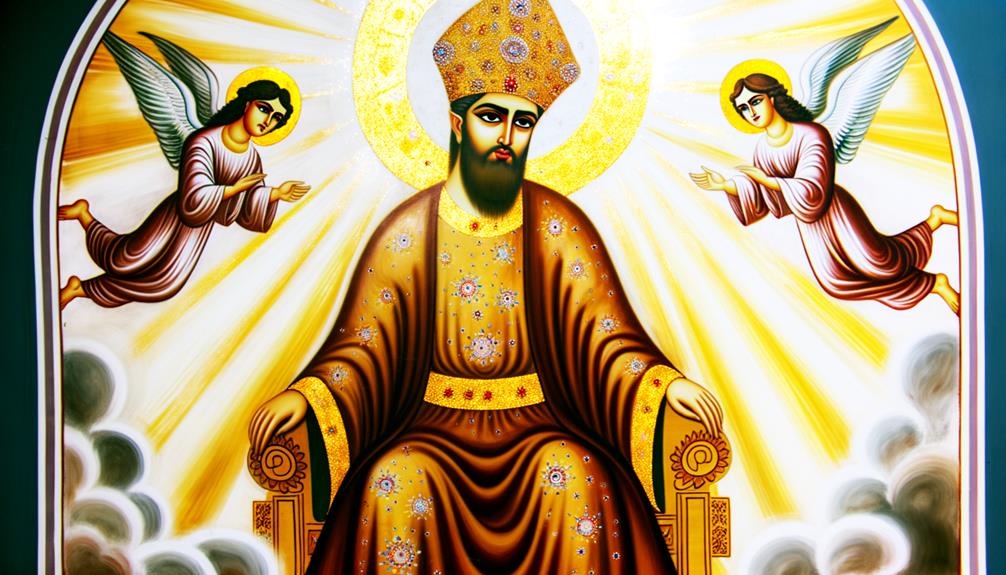King Meaning In The Bible: Authority and Leadership
In the Bible, the term “king” signifies a divinely appointed ruler called to lead God’s people. Kingship reflects God’s sovereignty and covenantal promises, beginning with the anointing of Saul and David, and continuing through Solomon’s wise and prosperous reign.
Prophets often guided and corrected kings, urging them to remain faithful to God’s laws. The Bible presents kings both as custodians of divine justice and as fallible humans susceptible to disobedience, emphasizing accountability and moral responsibility.
Ultimately, the prophecy of a Messianic king is fulfilled in Jesus, whose reign embodies ultimate divine authority. Explore further to uncover deeper insights into biblical kingship.

King Meaning in the Bible: Authority, Servanthood, and Divine Rule
| Aspect | Details |
|---|---|
| Term | King (Hebrew: Melek, Greek: Basileus) |
| Core Meaning | One who rules with authority, often divinely appointed |
| Biblical References | 1 Samuel 8, Psalm 24:8–10, Revelation 19:16 |
| Human Examples | Saul, David, Solomon, Hezekiah |
| Ultimate King | Jesus Christ – King of Kings and Lord of Lords |
| Spiritual Symbolism | Leadership, responsibility, justice, divine governance |
| Key Lesson | True kingship is rooted in obedience to God and serving others |
Divine Appointment

The concept of divine appointment in the Bible underscores the belief that kings are chosen by God to fulfill His sovereign purposes, as evidenced in various scriptural narratives and historical contexts.
This theological perspective is grounded in passages such as Daniel 2:21, which affirms, “He changes times and seasons; He deposes kings and raises up others.”
The divine initiation of leadership is further illustrated through the anointing practices in ancient Israel, where prophets, acting as divine intermediaries, selected and anointed kings (1 Samuel 10:1, 1 Kings 19:16). This act signified God’s endorsement and empowerment.
Historically, this belief bolstered the legitimacy of monarchical rule, reinforcing the notion that a king’s authority was sanctified and ordained by divine will, thereby integrating theological principles with political governance.
First Kings: Saul and David

Among the inaugural monarchs of Israel, Saul and David exemplify contrasting narratives that illustrate divine favor, kingship, and the complexities of human leadership in the biblical tradition.
Saul, anointed by the prophet Samuel, initially embodied Israel’s hopes yet faltered due to disobedience and pride, as recorded in 1 Samuel 15.
Conversely, David, also anointed by Samuel, rose from shepherd to sovereign, distinguished by his heart aligned with God, as seen in 1 Samuel 16:7.
David’s tenure, marked by military triumphs and deep repentance (2 Samuel 11-12), underscores a dynamic relationship with Yahweh.
These juxtaposed reigns elucidate the theological theme of divine sovereignty and human frailty within the sacred texts, setting foundational paradigms for biblical kingship.
Solomon’s Wisdom and Wealth

Renowned for his unparalleled wisdom and extraordinary wealth, Solomon’s reign epitomizes the zenith of Israelite monarchy as chronicled in the biblical narrative.
Solomon, son of David, ascended to the throne with divine favor, requesting wisdom from God to govern his people justly (1 Kings 3:9). His sagacity became legendary, exemplified by his judicious ruling in the case of two women claiming the same child (1 Kings 3:16-28).
Solomon’s wealth, symbolized by his opulent construction projects, including the First Temple in Jerusalem, highlights his era’s prosperity (1 Kings 6-7). His extensive trade networks and alliances further augmented Israel’s affluence.
Consequently, Solomon’s reign is a paradigm of divine blessing and human achievement intertwined in biblical historiography.
Kings and Prophets

Within the tapestry of Israel’s history, the dynamic interplay between kings and prophets reveals a profound theological narrative of divine guidance and human authority.
Prophets served as God’s mouthpieces, often challenging and guiding monarchs to uphold covenantal faithfulness. For instance, Nathan’s confrontation with King David (2 Samuel 12) highlights the prophet’s role in admonishing royal sin.
Elijah’s opposition to King Ahab (1 Kings 18) underscores the prophetic duty to confront idolatry and injustice. This tension between divine mandate and regal power underscores the Bible’s insistence on accountability.
Prophets, as intermediaries of divine will, acted to correct and direct kings, ensuring that their rule aligned with God’s law and purpose, thereby maintaining the spiritual integrity of the nation.
Kings of Judah and Israel

The historical records of the Kings of Judah and Israel provide a thorough narrative that illustrates the complexities of leadership, covenant fidelity, and divine judgment within the biblical framework.
From Saul’s tragic reign to David’s heart for God, and Solomon’s wisdom contrasted with his later apostasy, these accounts reveal multifaceted rulers whose decisions influenced national destiny.
The divided monarchy post-Solomon—comprising Israel in the north and Judah in the south—further complicates the biblical narrative.
Prophets like Elijah and Isaiah played pivotal roles, challenging kings to uphold God’s covenant.
Ultimately, these historical kings serve as theological case studies in obedience, repentance, and the consequences of moral failure, encapsulated within the scriptural context of 1 and 2 Kings and 1 and 2 Chronicles.
Jesus as King of Kings

How does the title ‘King of Kings‘ encapsulate the supreme authority and divine sovereignty of Jesus within the biblical narrative?
This exalted title is rooted in both Old and New Covenant scriptures, establishing Jesus as a preeminent ruler above all earthly kings.
Revelation 19:16 declares, ‘On his robe and on his thigh he has a name written, King of kings and Lord of lords.’ This proclamation affirms His ultimate dominion and the fulfillment of messianic prophecies (Isaiah 9:6-7).
Historically, monarchs wielded absolute power over their territories; however, Jesus’ kingship transcends temporal boundaries, embodying divine attributes of justice, righteousness, and eternal reign.
His sovereignty is not merely political but profoundly spiritual, affirming His role as the ultimate authority in heaven and earth.
Symbolism of Kingship

Exploring the symbolism of kingship in the Bible reveals profound layers of meaning that extend beyond mere governance, illustrating attributes such as divine authority, covenantal leadership, and the fulfillment of God’s promises.
In a theological context, kingship represents God’s sovereign rule over His people, as seen in passages like Psalm 47:7-8, where God is depicted as the ultimate King.
Historically, the anointing of kings like David (1 Samuel 16:13) symbolized a divine selection, reinforcing the concept of a covenantal relationship between God and Israel.
Scripturally, kingship also foreshadows the Messianic promise, with prophecies in Isaiah 9:6-7 pointing to an everlasting kingdom established by the Messiah.
Consequently, biblical kingship intertwines earthly authority with divine ordination and eschatological hope.
Kings and Moral Responsibility

In biblical theology, kings are often depicted as figures endowed with a divine mandate, tasked with upholding God’s laws and leading the people with integrity.
Historical accounts of kings like David and Solomon provide both commendable and cautionary examples of ethical leadership.
Scriptural analysis reveals that the moral responsibilities of kings were paramount, highlighting the consequences of their adherence to or deviation from divine expectations.
Divine Mandate Authority
The concept of Divine Mandate Authority in the Bible underscores the intrinsic moral responsibility bestowed upon kings, illustrating their role as both political leaders and spiritual stewards accountable to God’s will.
Biblically, kings such as David are depicted not merely as sovereign rulers but as divinely anointed figures charged with upholding God’s commandments.
Scriptural narratives, including passages like 1 Samuel 13:14, emphasize that a king’s legitimacy is contingent upon their adherence to divine statutes.
Historical context reveals that Israelite kings were often evaluated by prophets, such as Nathan and Samuel, who served as moral arbiters.
This theological framework positions kingship as an office intertwined with divine purpose, where failure to fulfill moral obligations could result in divine retribution or loss of authority.
Ethical Leadership Examples
Biblical narratives provide numerous instances where kings exemplify ethical leadership, demonstrating the profound moral responsibilities inherent in their divine mandate.
For example, King David, despite his flaws, sought repentance and justice, embodying a heart aligned with God’s will (2 Samuel 12:13). King Josiah’s reforms (2 Kings 23:1-25) illustrate an unwavering commitment to covenantal faithfulness, eradicating idolatry and restoring true worship.
| King | Ethical Leadership Example |
|---|---|
| David | Sought repentance and justice (2 Samuel 12:13) |
| Solomon | Advocated wisdom and discernment (1 Kings 3:9-12) |
| Josiah | Reformed religious practices (2 Kings 23:1-25) |
These kings underscore the intrinsic link between ethical governance and adherence to divine commandments, shaping a legacy of moral responsibility.
Lessons From Disobedient Kings

The narratives of disobedient kings in the Bible underscore significant theological and historical lessons, particularly concerning the consequences of disobedience and the resultant loss of divine favor.
Scriptural accounts such as those of King Saul and King Solomon illustrate how deviation from God’s commandments led to their downfall and the erosion of their kingdoms.
These examples serve as potent reminders of the critical importance of adherence to divine will in maintaining divine approval and sovereignty.
Consequences of Disobedience
Throughout the Bible, the stories of disobedient kings serve as profound lessons on the grave consequences of straying from God’s commandments.
King Saul, for instance, faced dire repercussions for his disobedience in 1 Samuel 15, where his failure to utterly destroy the Amalekites led to his rejection by God. Similarly, King Solomon’s idolatry, described in 1 Kings 11, resulted in the division of his kingdom.
These narratives underscore the theological principle that divine mandates are not mere suggestions but imperatives carrying significant weight. Historical context reveals that disobedience often precipitated national turmoil, illustrating a broader divine justice.
Scriptural analysis of these accounts reinforces the importance of fidelity to God’s will, hence offering enduring lessons for all believers.
Loss of Divine Favor
A recurring theme in the biblical narratives of Israel’s monarchy is the severe loss of divine favor experienced by kings who defied God’s commandments.
Saul, Israel’s first king, lost his reign due to incomplete obedience, as seen in 1 Samuel 15:23. Similarly, Solomon’s idolatry led to the division of his kingdom, as recorded in 1 Kings 11:11.
The theological implications are profound: divine favor is not merely a blessing but also contingent upon covenantal fidelity. Historical accounts of these kings underscore that deviations from divine mandates resulted in political turmoil and personal downfall.
Scriptural analysis reveals that disobedience among monarchs served as a didactic tool for Israel, emphasizing the necessity of unwavering adherence to God’s law.
Kingship in Prophecy

Biblical prophecy often intertwines the concept of kingship with divine promises and future fulfillment, revealing a profound anticipation of a messianic ruler.
The prophetic literature, particularly in Isaiah 9:6-7 and Jeremiah 23:5-6, speaks of a coming king from David’s lineage who will establish an everlasting, righteous dominion.
This messianic expectation is deeply rooted in the Davidic Covenant, where God promises David’s throne shall be established forever (2 Samuel 7:16).
In Christian theology, these prophecies are fulfilled in Jesus Christ, who is seen as the ultimate King, transcending earthly monarchies.
Theologically, this kingship is not merely political but encompasses spiritual sovereignty, with Christ reigning supreme over both the earthly and the divine domains.
Conclusion
In summation, the concept of kingship in the Bible encapsulates a divine mandate, historical narratives of monarchs like Saul, David, and Solomon, and a profound moral and prophetic symbolism.
These kings, both exalted and fallen, serve as archetypes through which divine authority and human frailty are examined.
The biblical portrayal of kingship therefore functions not merely as historical record but as a theological discourse, inviting reflection on the intricate interplay between divine sovereignty and human responsibility.






